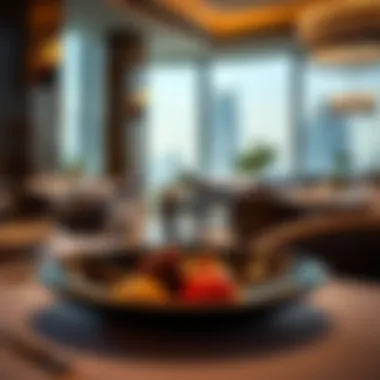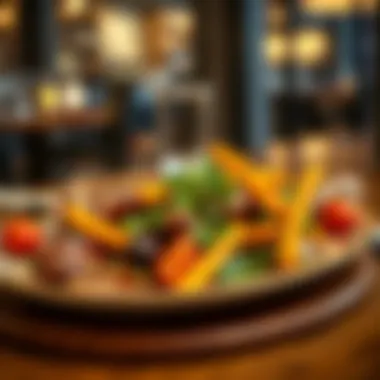Discovering Dubai's Top Dining Experiences


Intro
Dubai is not merely a city; it’s a living tapestry woven from diverse cultures, demographics, and experiences. One of the most prominent threads in this fabric is its culinary scene. The fine dining establishments and casual eateries across the city offer a remarkable array of flavors, each telling a story of heritage, geography, and innovation. People from all walks of life come together around meals, making dining a critical aspect of Dubai's social and cultural life.
This article embarks on a comprehensive journey to uncover the best restaurants in Dubai. It aims to delve into various cuisines available, allowing readers to discover not just where to eat, but what the sights, sounds, and tastes represent. Each selected venue encapsulates the essence of Dubai, showcasing unique dishes that stand out from the ordinary.
From the lavish settings that cater to the elite to humble food stalls beloved by the locals, every establishment offers more than just food; it presents an experience. The atmosphere, service quality, and even the cultural nuances all contribute to the dining experience, making each visit memorable.
To aid in navigating this rich culinary landscape, we will discuss essential trends, highlight standout restaurants, and provide insights that enhance your dining decisions. By understanding the motivations that influence these choices, diners can immerse themselves deeper into Dubai's vibrant restaurant world.
Preamble to Dubai's Culinary Scene
Dubai stands as a testament to the culinary wonders that arise when cultures intertwine. Nestled at the crossroads of various continents, it showcases a unique dining tapestry that promises an adventure for the taste buds. Understanding this vibrant culinary scene isn't just about indulging in a meal; it’s about experiencing the fusion of flavors, traditions, and innovative practices that are vital to the city’s identity.
A Melting Pot of Cultures
Dubai is truly a melting pot. It’s like a grand bazaar where culinary traditions blend seamlessly. The expatriate population contributes an array of distinct flavors ranging from Indian curry houses to Arabic shawarma stalls, from Italian trattorias to Chinese dim sum eateries. These influences create a rich mosaic of tastes.
The city offers a culinary passport – every bite tells a story. For instance, when you dine at Ravi Restaurant, an establishment famous for its Pakistani cuisine, you’re not just having food; you’re experiencing a slice of life from a different part of the world.
This diversity goes beyond menus. It reflects in cooking styles, how food is served, and even dining etiquette. From cozy family-run establishments to lavish restaurants with elaborate tasting menus, Dubai caters to every sense and every palate. The opportunity to enjoy various cuisines allows diners to travel the world without leaving the table. This variety offers more than just variety; it creates conversations, bridges gaps, and builds friendships.
The Evolution of Dining Preferences
Over the years, Dubai's dining preferences have transformed as rapidly as the skyline itself. Once dominated by traditional Middle Eastern fare, the scene now features global cuisines that cater to evolving tastes. The influx of international chefs and culinary talent has further fueled this evolution.
In the past, food was merely sustenance. Nowadays, it has become an experience. The rise of dining concepts like pop-up restaurants and gourmet food trucks illustrates this shift. These modern approaches to dining allow chefs to innovate and capture market trends more fluidly, thus challenging the status quo.
Moreover, this evolution mirrors changing lifestyles. As people are becoming more health-conscious, there is a noticeable increase in plant-based offerings and sustainable practices. Restaurants now emphasize locally sourced ingredients and responsible sourcing, a response to the growing demand for ethical dining.
This ongoing alteration of preferences not only benefits diners but also empowers restaurant owners to continuously adapt, innovate, and push culinary boundaries. Ultimately, understanding these shifts provides valuable insights for investors, restaurateurs, and anyone involved in the culinary business in Dubai. With such a rich and diverse gastronomic landscape, the opportunities are immense, making it crucial for stakeholders to stay ahead of the curve.
Criteria for Evaluating Restaurants
When it comes to picking a place to eat in a city as vibrant and diverse as Dubai, the criteria for evaluating restaurants plays an important role. It’s not just about filling your stomach; dining in Dubai has evolved into a cultural experience that reflects the city's cosmopolitan nature. Investors and business-minded individuals often look to the restaurant scene as an imperative aspect of the economy, while food enthusiasts don’t merely want a meal—they seek an experience.
Culinary Excellence
Culinary excellence remains a cornerstone of any great dining experience. In Dubai, this means more than just standard fare; it’s about creativity, innovation, and the art of cooking.
- Distinctive Flavors: Dubai's restaurants feature anything from the traditional spices of Middle Eastern cuisine to the fresh herbs of Mediterranean dishes. Consider the way local vendors blend regional influences to create something uniquely their own. For instance, a restaurant specializing in fusion dishes might take a classic dish like a lamb kebab and infuse it with Thai flavors, resulting in something that intrigues the palate while respecting tradition.
- Ingredient Sourcing: Attention to high-quality ingredients speaks volumes about a restaurant’s commitment to excellence. Many top establishments in Dubai fastidiously source their ingredients, often opting for organic or sustainably harvested products. The taste difference is palpable and can transform a simple meal into something extraordinary.
- Culinary Techniques: Mastery of cooking techniques is crucial, as it reflects a chef’s skill level. Whether it’s sous-vide steak cooked to perfection or a flambé dessert that captivates diners during preparation, these techniques enhance the flavors and overall dining experience.
In evaluating culinary excellence, it’s more about the story behind the dish and the passion infused into its preparation that counts.
Ambiance and Service Quality
Equally important to culinary offerings are the ambiance and service quality. These elements can elevate a meal from ordinary to memorable!
- Atmospheric Elements: The ambiance encompasses not only the decor but also factors like lighting and background music. High-end restaurants in Dubai often use plush fabrics, intricate lighting designs, and art installations to create an inviting setting. For example, a rooftop restaurant boasting views of the Burj Khalifa doesn’t just serve great food; it provides an experience that tantalizes multiple senses.
- Personalized Service: Service quality is fundamental; it can make or break the dining experience. Knowledgeable staff who can guide patrons through the menu or suggest wine pairings elevate the overall experience. Excellent service often reflects a restaurant’s standards, where staff goes beyond mere hospitality to create a welcoming environment.
"It's not just what’s served on the plate, but how it’s presented and shared that makes a meal remarkable."
Fine Dining Options
Fine dining in Dubai represents more than just a meal; it embodies a meld of culture, sophistication, and impeccable service. This realm isn’t just meant for the elite; rather, it appeals to anyone who seeks to elevate their dining experiences. The options available reflect the multicultural tapestry of Dubai, ranging from innovative culinary techniques to classic interpretations of traditional dishes. Understanding why fine dining is indispensable in this exploration helps set the stage for appreciating what Dubai has to offer.
Signature Restaurants to Consider


Influence of Celebrity Chefs
The presence of celebrity chefs has dramatically transformed Dubai’s dining landscape. These renowned figures bring not only their culinary skills but also a unique storytelling element that enriches the dining experience. Patrick Cappiello, known for his award-winning wine selections, serves his dishes at restaurants that reflect his passion for sustainability and local ingredients. Such endorsements elevate the status of a restaurant, inherently pulling in food enthusiasts from all corners.
A key characteristic of these establishments is that they often incorporate seasonal menus, allowing diners the opportunity to experience a diverse range of flavors throughout the year. This marks them as a popular choice for food lovers, ensuring that each visit offers something unique. It's not only the food that sets these restaurants apart; the ambiance is meticulously crafted, echoing the chef's style and vision, which adds to the allure.
Yet, while dining at these establishments is undoubtedly appealing, one should be mindful of the reservations needed, often weeks in advance. This can become a barrier for impromptu dinner plans, so it's well worth considering these logistical details when exploring the culinary landscape.
Unique Dining Concepts
What makes dining in Dubai even more captivating is the emergence of unique dining concepts. Restaurants are now looking beyond mere food presentation to create experiences that linger in the memory. For example, At.mosphere, located on the 148th floor of the Burj Khalifa, doesn’t just serve exquisite dishes; it provides a breathtaking view that is unparalleled.
One prominent aspect of unique dining is the thematic elements that propel these experiences. Think about dining in a darkened room, where guests rely on their taste and smell—such concepts stimulate the senses in ways that traditional setups cannot. This draws a considerable crowd, especially among adventurous diners eager for something outside the norm.
However, these dining experiences may come with higher price tags, which can deter some would-be patrons. It’s essential to weigh the distinctions that make these choices notable against what comes with them economically.
Cascading Waterfalls and Roof Top Views
When exploring Dubai's fine dining scene, one cannot overlook the significance of setting. The city boasts venues that feature cascading waterfalls or striking rooftop vistas. These elements not only enhance the aesthetic appeal but can also significantly influence the dining experience. Dining amidst the soothing sound of water or gazing out at the city skyline provides a sense of tranquility that complements the exquisite cuisine.
When selecting a restaurant, consider those that offer outdoor seating with magnificent views. Places like The Rooftop at the Burj Al Arab offer a panoramic view of the Arabian Gulf along with stellar culinary creations, making it a treasured choice for many. It’s not merely about the food; it’s about how it merges with the environment.
Middle Eastern Cuisine: A Local Favorite
Middle Eastern cuisine holds a cherished place in the hearts and palates of Dubai's residents and visitors alike. The importance of this theme within the exploration of Dubai's restaurant scene cannot be overstated. At the core, it represents not just food, but also cultural heritage and community bonding. Many diners find themselves drawn to the warmth and spice of Middle Eastern dishes, which serve as gateways to experiencing the region's rich history and traditions.
This section will delve into traditional dishes that shine a light on the culinary craftsmanship of the region, as well as showcase innovative takes that showcase the creativity and versatility of local chefs. As the culinary landscape of Dubai continues to evolve, Middle Eastern cuisine remains a constant favorite, acting as a hub where cultures mix and flavors harmonize.
Traditional Dishes to Savor
Mezze Selections
Mezze selections often steal the spotlight in Middle Eastern dining, providing a delightful introduction to the myriad of flavors the cuisine has to offer. These small plates serve not just a meal, but an experience steeped in social interaction. Usually enjoyed in a communal style, mezze allows diners to indulge in different flavors with little bites—a perfect option for those unsure where to start or eager to share.
One standout characteristic of mezze is variety. Common offerings like hummus, baba ghanoush, and tabbouleh invite diners to express their own preferences while enjoying the culinary journey together. This array of choices contributes to its popularity, as diners can tailor their experience based on their palates and dietary preferences.
However, mezze also encourages an element of patience—waiting for one another to savor each dish, prolonging the meal, and allowing conversations to flow. This is both an advantage and a potential drawback; while it fosters connection, some might argue it delays the more substantial courses. Still, its social nature and the joy of dining make mezze selections an integral part of Middle Eastern dining culture.
Grilled Meats and Kebabs
Grilled meats and kebabs hold a special spot in Middle Eastern cuisine, offering hearty and satisfying options for those seeking a filling, flavorful meal. The hallmark of these dishes often lies in their preparation—where marinated meats are often grilled to perfection over open flames, producing that smoky, charred flavor that many crave.
The unique aspect of grilled meats is their versatility. Be it tender lamb, juicy chicken, or spiced beef, each offering can be tailored with various spices and marinades unique to regions within the Middle East. This adaptability is key to its popularity, as it allows chefs to infuse their own creativity into traditional recipes.
While grilled meats can be an indulgent treat, it's essential to consider portion sizes and accompanying dishes. Often enjoyed with aromatic rice or fresh salads, it’s a well-rounded meal that fills the belly and nurtures the soul. However, diners need to strike a balance, as overindulgence might lead to a heavy meal experience. Still, the craftsmanship behind each skewer remains a true testament to the rich culinary heritage that Dubai’s kitchens uphold.
Fusion Takes on Middle Eastern Food
As the world becomes more interconnected, Dubai’s culinary landscape reflects this fusion through innovative interpretations of traditional Middle Eastern dishes. Chefs are creatively merging flavors from regions such as Asia, Europe, and beyond, offering diners an opportunity to experience familiar tastes in exciting new forms. Whether it’s shawarma tacos or za'atar flatbreads topped with gourmet ingredients, these modern takes have found significant traction in Dubai's vibrant dining scene.
The beauty of fusion cuisine lies in its ability to surprise and delight, catering to an ever-evolving audience who craves novelty while remaining connected to tradition. Yet, it's crucial for chefs to honor the essence of the original dishes, ensuring authenticity isn’t lost in the process. This balance of honoring the past while exploring the future makes fusion takes on Middle Eastern food a noteworthy highlight in Dubai's restaurant offerings.
Asian Influences in Dubai Dining
Asian cuisine plays a pivotal role in shaping the dining landscape of Dubai. The city is home to a diverse population, bringing together flavors and culinary traditions from various Asian countries. From tantalizing street food to upscale dining experiences, the impact of Asian flavors is evident everywhere. In this vibrant melting pot, Asian influences have crafted a unique culinary narrative, enhancing the choices available to diners and contributing to the city’s reputation as a gastronomic destination.
Southeast Asian Flavors
Southeast Asian cuisine, characterized by its bold flavors and aromatic spices, holds a significant place in Dubai's diverse dining scene. This region's rich culinary heritage offers dishes that reflect a harmonious blend of sweet, sour, salty, and spicy elements, making it approachable yet exciting for palates from all backgrounds.


Popular Regional Dishes
Popular regional dishes from Southeast Asia, such as Nasi Lemak from Malaysia or Pad Thai from Thailand, are celebrated for their depth of flavor and presentation. Each dish tells a story steeped in cultural significance. They are often made with fresh ingredients, drawing diners into a culinary tale with every bite. This prominence showcases not just food, but also the cultural narratives that come with it, encouraging sharing and community through dining. These dishes often make for a familiar yet exotic dining experience, appealing to both locals and tourists alike.
Some might say the flavors are unforgettable, as they transport diners right to the heart of Southeast Asia. The dishes are best enjoyed in communal settings, fostering a sense of togetherness that mirrors the busy multicultural environment of Dubai.
Contemporary Asian Concepts
Contemporary Asian dining concepts are increasingly gaining traction, focusing on modern interpretations of traditional flavors. Restaurants embracing these concepts often play around with presentation and technique, creating visually stunning dishes that surprise and delight the senses.
This blend of modernity with tradition gives rise to unique experiences—think sushi tacos or mango sticky rice served as a deconstructed dessert. These innovative takes are a way to engage a younger audience, often utilizing techniques not traditionally found in the original cuisines.
The benefit of contemporary Asian concepts is significant in a city that values novelty while respecting tradition. They offer a fresh perspective on familiar flavors, leading to heightened interest for diners seeking something outside the status quo. This innovation, however, may also lead to critiques from purists who feel that the essence of the cuisine is lost in translation.
The Rise of Japanese Cuisine
As Japanese cuisine garners more attention across the globe, Dubai has certainly embraced this rising trend. Known for its elegant simplicity and fresh ingredients, Japanese food is not just about taste; it's a ceremonial experience. The culture of sushi, ramen, and traditional settings translates well into Dubai's upscale dining scene, catering to both locals and expatriates with a thirst for authentic flavors.
Sushi Bars to Consider
When exploring sushi bars in Dubai, one can find a wide range of offerings, from traditional nigiri to creative sushi rolls that reflect local tastes. Sushi plays another important role in social dining, promoting a shared experience and a culture of artful presentation. These bars often employ skilled chefs who craft each piece with precision and artistry, elevating the experience beyond mere eating to something akin to a ritual.
The allure of sushi bars lies in their ability to marry Japan's culinary traditions with Dubai’s cosmopolitan flair. However, diners should be mindful that not all sushi bars maintain the highest standards of quality when it comes to sourcing fresh fish, which is vital for an authentic sushi experience.
Robatayaki and Izakayas
Robatayaki and izakayas are two key components of the Japanese dining experience that continue to attract attention in Dubai. Robatayaki, or "fireside cooking," involves grilling skewered meats, vegetables, and seafood over hot coals, giving food a distinct smoky flavor. This interactive style of dining allows patrons to engage with the chefs as their food is prepared right before their eyes.
Izakayas, on the other hand, are casual pubs serving a variety of small dishes and drinks in a laid-back ambiance. They often feature an extensive selection of sake, making them perfect for after-work relaxation or social gatherings. Both of these dining styles invite a communal ethos, encouraging sharing and conversation over delicious food.
In the context of Dubai, the emerging popularity of robatayaki and izakayas aligns with a city-wide quest for authenticity in flavors and experiences, providing diners with options that are both satisfying and culturally rich.
With every meal, the culinary richness of Dubai continues to reflect its cultural tapestry, intertwining histories, and modern influences that result in an extraordinary dining experience.
The Role of International Cuisines
The culinary landscape in Dubai is not merely a collection of eateries; it's a vibrant tapestry woven from cultures around the globe. This diversity significantly enhances the dining experience, making it essential for prospective diners to appreciate the role of international cuisines. Visitors to Dubai are greeted with an array of flavor profiles and cooking techniques, as global influences fuse and mingle with local traditions. Such a rich variety offers an exciting opportunity to discover new tastes and culinary experiences that one might not encounter elsewhere.
Globalization has played a crucial role in shaping Dubai's food scene. The city serves as a melting pot, attracting chefs and food enthusiasts from every corner of the world. As a result, dining establishments reflect a mosaic of cuisines, filtered through the lens of local preferences and available ingredients. Consider this: the sushi you find here may not only be a dish from Japan but also influenced by the spices of the Middle East or the techniques of Southeast Asian cooking.
- Benefit of Cultural Exchange: The blending of flavors fosters creativity in the kitchen. For instance, a pizza might be topped with za'atar, a Middle Eastern herb blend, or served with a side of hummus instead of traditional tomato sauce. This cultural exchange not only enhances culinary creativity but also fosters communal dining experiences that resonate with diners looking for something more than just a meal.
- Consideration for Investors and Developers: Understanding these international influences is critical when considering restaurant investments. Potential investors should look into how cuisine integration might impact a restaurant’s appeal and profitability. This awareness could guide the creation of menus that attract a broader customer base while also preserving the essence of each culinary tradition.
Italian and Mediterranean Influences
Italian cuisine in Dubai is more than just pasta and pizza; it's a celebration of flavors that has evolved alongside various Mediterranean influences. The city's Italian restaurants, tucked away in both high-end hotels and cozy street corners, provide an inviting taste of Italy while embracing local ingredients and traditions.
Diners can explore a range of options from freshly made pasta to delicate seafood dishes. One noteworthy example is pistachio pesto pasta, which combines a classic Italian sauce with Middle Eastern nuts, giving it an exciting twist. Moreover, many establishments are now focusing on sourcing ingredients locally, supporting sustainable practices while also elevating the taste of their offerings.
The ambiance of these restaurants also reflects an Italian warmth, with vibrant decorations and welcoming staff making every meal an enjoyable experience. Importantly, investors should note that establishing a connection with local suppliers can not only reduce costs but also create a unique selling proposition that attracts discerning diners looking for authenticity.
American Diners in Dubai
American cuisine has carved its own niche in Dubai's diverse dining scene. From classic diners serving burgers and fries to upscale steakhouses featuring prime cuts, American food in the city captures a stay-at-home feel combined with sophisticated flair. Restaurants often blend American comfort food with regional spices, leading to dishes like spicy chicken sliders and tandoori fish tacos.
Another essential aspect is the role of casual dining culture. Many expatriates and locals appreciate an American-style diner for the comfortable, relaxed atmosphere that encourages social interaction. This laid-back vibe makes it a popular spot for families and friends, broadening its appeal.
“The experience is incredibly dynamic. It feels like you are part of something much larger than just a dinner; it's a gathering of cultures.” – A local diner reflecting on the cosmopolitan nature of dining in Dubai.
Investors considering American dining options should think about positioning their establishments in high-traffic areas where the expatriate community congregates, as this demographic is often seeking the familiar tastes of home. Additionally, creating menu items that cater to diverse dietary preferences can further attract a larger customer base.
As Dubai continues to grow into a global culinary hotspot, the role of international cuisines remains paramount. Emphasizing the uniqueness of each culinary style while encouraging creative fusions will contribute to an evolving restaurant landscape, appealing to both local residents and tourists alike. The thread of international influences through every dish promises to keep the dining scene fresh and exciting.


Dining Trends and Innovations
The culinary scene in Dubai is not just a mosaic of flavors and dishes. It reflects broader societal trends and innovations that speak to the city’s dynamic community. Dining trends and innovations act as a mirror, showcasing how the food and hospitality industries adapt to changing consumer preferences, technological advancements, and environmental considerations. Understanding these trends is essential for both diners seeking extraordinary experiences and investors looking at restaurant ventures in this vibrant market.
Sustainability in Restaurant Practices
Sustainability has become a pivotal part of modern dining practices. In Dubai, restaurants are increasingly recognizing the need to minimize their environmental footprint. This shift is essential, not just for ethical considerations but also as a strategic move to attract eco-conscious diners.
Restaurateurs are implementing several strategies to embrace sustainability:
- Locally Sourced Ingredients: Many dining establishments now partner with local farmers and suppliers. This not only reduces transport emissions but also ensures fresher produce. Diners enjoy a farm-to-table experience, knowing their meals are seasonal and authentic.
- Waste Management Practices: Innovative waste management solutions are emerging. For instance, some restaurants are composting food scraps or repurposing leftovers creatively, significantly lowering their waste output.
- Energy Efficient Operations: Many places are adopting energy-saving appliances, using LED lighting, and investing in renewable energy sources. This technological leap helps reduce operational costs while appealing to customers who prioritize sustainable choices.
"Sustainable dining is not just a trend anymore; it’s a necessity for the future of humanity and business."
Emergence of Plant-Based Dining
With a worldwide rise in health consciousness and environmental awareness, plant-based dining has gained traction in Dubai. Menus are increasingly reflecting this shift, evolving beyond traditional vegetarian options into sophisticated plant-based culinary experiences.
The restaurant scene in Dubai is dotted with an array of eateries focusing on plant-based dishes. From gourmet vegan sushi at Maya to hearty Middle Eastern falafel bowls at Wild & The Moon, the options are vast.
- Health Benefits: Plant-based diets are associated with numerous health benefits, appealing to health-conscious diners. Restaurants highlight these attributes, presenting dishes that cater to various dietary needs while ensuring flavor is not sacrificed.
- Culinary Creativity: Chefs are pushing boundaries, concocting dishes that use innovative techniques and unexpected ingredients. This creativity not only enhances flavor but also challenges culinary norms, displaying to diners that plant-based doesn’t mean boring.
- Cultural Fusion: Many Dubai restaurants blend local culinary traditions with plant-based innovations, creating unique dining experiences. The merging of flavors showcases a progressive interpretation of cuisine, enriching Dubai's already diverse food culture.
Practical Considerations for Diners
Dining in Dubai is more than just satisfying hunger; it’s an experience intertwined with cultural nuances and local customs. As a cosmopolitan hub, the city boasts an array of dining establishments, ranging from opulent fine dining to charming hole-in-the-wall spots. However, navigating this culinary landscape effectively requires awareness of certain practical considerations.
Reservation Strategies
Given the popularity of Dubai's dining scene, securing a reservation at top restaurants is advisable, especially during peak hours or special occasions. Not only does this save you from waiting hours, but it also ensures you can enjoy the ambiance without a hitch. Here are several strategies for making successful reservations:
- Early Planning: Popular restaurants often book up weeks in advance. If there's a must-try spot on your list, don’t hesitate to make a reservation as soon as your travel dates are confirmed.
- Flexible Timing: If possible, aim for off-peak times such as weekdays or early dining hours. Many places tend to fill up at weekends, and dining earlier in the evening may yield a more relaxed experience.
- Use Technology: Many restaurants in Dubai offer online booking options via their websites or apps like OpenTable. Utilizing these platforms can often grant access to special deals or exclusive tables.
- Follow Up: As your reservation date nears, it doesn’t hurt to confirm your booking, especially if you've made it a while ago. A quick call can save potential misunderstanding.
Understanding Dining Etiquette
Understanding local dining etiquette can greatly enhance your overall experience in Dubai’s diverse restaurant landscape. Different cultures come together in this city, manifesting in various dining customs. Here are a few key points to keep in mind:
- Dress Code: While Dubai is generally permissive, upscale restaurants usually have a smart-casual dress code. It’s wise to check beforehand to avoid feeling out of place.
- Tipping: While service charges are often included in the bill, leaving a 10-15% gratuity on top is customary if you’re pleased with your meal. Consider rounding up your bill as a polite gesture.
- Cultural Respect: During the month of Ramadan, it is expected to refrain from eating or drinking in public during daylight hours. Many restaurants adapt by offering special meals after sunset. Demonstrating this respect goes a long way in integrating into local customs.
- Dining with Locals: If you find yourself invited to dine with locals, be prepared for a few fascinating traditions—such as sharing dishes or refusing the first offer of food as a sign of politeness.
"Dining in Dubai is not just about taste; it's about connection—between cultures, flavors, and people."
Ultimately, a well-planned dining experience in Dubai can mean the difference between an average meal and an extraordinary culinary adventure. By keeping reservations and etiquette in mind, diners ensure they are well-prepared to engage with the city’s vibrant gastronomic offerings.
The End: The Importance of Dining in Dubai
Dining in Dubai isn't merely about filling one's stomach; it's a rich tapestry of traditions, flavors, and sharable experiences that elevate social interactions. The fusion of cultures reflected in the city's culinary offerings showcases not only gastronomic creativity but also a deeper insight into the heritage and communal values of a vast array of ethnicities. Investors, homebuyers, realtors, analysts, and developers can all appreciate this dynamic, as understanding the food scene here can serve as a valuable barometer of social trends and consumer behaviors in a cosmopolitan setting.
Cultural Significance of Food Experiences
Food experiences in Dubai hold significant cultural weight. The city is a crossroads for various culinary traditions; from traditional Emirati dishes to vibrant international fare, restaurants here often double as cultural institutions. For many locals and expatriates alike, sharing a meal becomes a means of fostering connections, bridging language barriers, and creating community bonds.
Emirati cuisine reflects the United Arab Emirates' rich history and its ties to trade routes across the Middle East, showcasing dishes like Al Harees and Machboos that are emblematic of the region's flavors and history. Family gatherings often center around these dishes, symbolizing not just nourishment but also tradition and storytelling.
Furthermore, food festivals and culinary events play a pivotal role in uniting diverse communities while introducing new flavors to a receptive populace. Events like Dubai Food Festival spotlight local chefs and innovative culinary concepts, drawing in crowds and emphasizing the city’s commitment to celebrating its multicultural tapestry through food. This aspect is crucial for businesses and investors looking to understand consumer preferences and where they're heading next.
Future of Dining in Dubai
Looking ahead, the dining landscape in Dubai is poised to evolve even further. Several trends are worth noting that not only influence restaurant dynamics but also reflect broader shifts in societal values.
- Sustainability: As awareness around environmental issues heightens, eateries are seeking to implement sustainable practices. From sourcing local ingredients to reducing waste, this trend resonates with health-conscious diners and environmentally aware consumers.
- Digital Transformation: Technology is reshaping dining experiences. Home delivery apps, digital menus, and reservation systems elevate convenience yet keep core culinary excellence at the forefront. The rise of global online food delivery services indicates a clear shift toward a more tech-centric approach in the restaurant industry.
- Health-Oriented Menus: An increased demand for plant-based and health-conscious options is evident, driven by changing dietary perceptions and health awareness. Restaurants are adapting by incorporating organic ingredients and innovative flavors, catering to a health-savvy clientele.
All these developments point towards a future rich in culinary diversity, with innovations that respect tradition while pushing gastronomic boundaries. With Dubai continuing to establish itself as a global dining destination, builders and business leaders must recognize these shifts as compelling opportunities for growth and investment. As dining plays an integral role in both social and economic frameworks, understanding these trends will be essential for anyone looking to thrive within this landscape.
"Dining is not just a practice; it’s a reflection of culture, economy, and community. Understanding it is key for any stakeholder in Dubai’s upward trajectory.”
For more insights on culinary trends and dining habits, check out resources like Wikipedia and Britannica.















